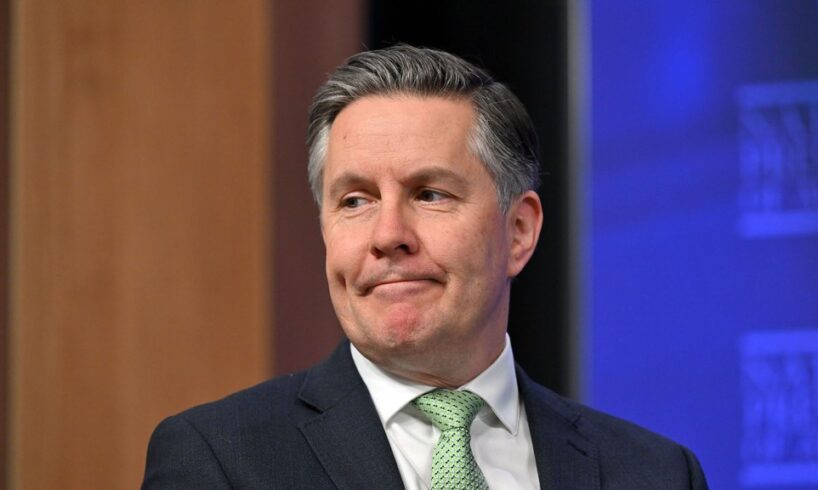
Health Minister Mark Butler’s plan to divert kids with mild developmental delays and autism away from the NDIS and toward a new, vague national program called Thriving Kids has received some strong reactions, but mostly the response has been cautiously positive from autism groups and service providers.
If done right, Thriving Kids will plug a gap in the current services that is driving parents — especially middle-class parents with greater access to and more skills for navigating care systems — toward the NDIS, filling the scheme with kids with mild disabilities better served with additional support in existing environments rather than bespoke (and more expensive) NDIS services.
With children, and especially boys, being diagnosed with autism as the biggest driver of the expansion of the NDIS, Thriving Kids — scheduled (optimistically, you’d think) to commence in 2026 and intended only for newly diagnosed kids, not existing NDIS clients — seems the best solution to the unsustainably rapid increase in NDIS costs.
But as mental health expert Patrick McGorry has pointed out, what’s been left unaddressed is the ease with which kids can now be diagnosed with autism, or what others call “autism creep”.
Related Article Block Placeholder
Article ID: 1199272
The NDIS also incentivises parents to — perfectly understandably — game the diagnostic system to secure higher levels of support for their children. McGorry, whose views enrage some autism campaigners, has been warning consistently about overdiagnosis of autism, the way it’s skewed toward wealthier families, and the fact that the vast sums of money consumed by the NDIS could achieve much better results in young people’s mental health if deployed differently.
Independent. Irreverent. In your inbox
Get the headlines they don’t want you to read. Sign up to Crikey’s free newsletters for fearless reporting, sharp analysis, and a touch of chaos
By continuing, you agree to our Terms & Conditions and Privacy Policy.
The risk is thus that Thriving Kids becomes a cheaper version of the same problem as the NDIS currently — and that as costs (to be funded jointly with the states and territories) start rising quickly under pressure from parents pushing for more support for their children, we start talking about the program’s “social licence”. In health policy, as elsewhere, politicians have a history of responding to the demands of politically influential groups rather than targeting limited taxpayer resources at delivering the biggest returns, which may not benefit vocal, well-organised lobby groups.
The other risk is that the expected cost benefits of delivering support services for kids with mild developmental issues in existing environments, like schools, rather than via bespoke NDIS services, fail to materialise due to state and territory delivery failures.
The generally positive reaction to Butler’s announcement extended to the opposition. Relevant shadow ministers Anne Ruston and Phillip Thompson promised to “work constructively on sensible NDIS reforms, including its currently unsustainable growth rate, to secure the Scheme’s future”.
They also pointed out that “this is in contrast to Labor’s record in opposition of politicising NDIS reform for short-term political gain”. In an era when everyone laments the failure of politicians to work together rather than mindlessly bicker, it’s worth noting that Labor, in opposition, demonised every effort by Coalition governments to rein in the NDIS as an outrageous attack on people with disabilities.
Once elected, Labor announced how shocked it was that, yes, indeed, NDIS growth was out of control and needed to be reined in. The Labor minister most responsible for the creation of the NDIS and thus most bulletproof to criticism, Bill Shorten, was charged with achieving that. But rather than pay Labor back with some of its own treatment — a politically understandable and perhaps even advantageous reaction — the Coalition has elected to park the politics of reflexive oppositionism and endorse the government’s approach.
Related Article Block Placeholder
Article ID: 1216948
The other noteworthy contrast is between the clamour for cost-cutting, and Labor’s willingness to respond to it, on the NDIS, compared to its determination to accelerate spending on defence, which is slated to grow at 5% annually over the forward estimates.
That should be growing far more quickly, according to commentators, defence experts and, of course, our dear friends in the Trump administration, who would all like to see defence spending growing even faster than the NDIS currently is.
No-one’s complaining about the “social licence” of defence spending or discussing creative ideas about how to more effectively target spending. The lurid stories of abuse of defence spending — usually with several more zeroes than revelations about NDIS fraud — have to await periodic auditor-general reports because of the tight secrecy that surrounds defence. There are no defence think tanks prepared to back moves to curb spending, much of which flows overseas to foreign weapons manufacturers rather than disability service providers.
An unfair comparison? It’s not about pitting submarines versus kids with disabilities. It’s about having the same expectations about both — that governments should always look for ways to most effectively target limited resources to deliver the best outcomes. When it comes to our fastest sources of spending, that only applies to kids with disabilities.





